This year Passover begins on the end of Shabbat, March 27th. Why and how we celebrate Passover, in addition to the last three plagues, suffered by the Egyptians: Locusts (אַרְבֶּה, arbeh), Darkness (חֹשֶׁךְ, choshech), and the slaying of the firstborn (מכת בכורות), in parashat Bo, we are given the laws of Passover, both as they were observed that first time and as they are meant to be kept for future generations.
Then the LORD said to Moses Come to Pharaoh

The title comes from the first words of the first verse of the reading, which say, “Then the LORD said to Moses, Come to Pharaoh, for I have hardened his heart” (Exodus 10:1). To avoid the plague, the Israelites are given the instructions for the Passover sacrifice and the laws of the Feast of Unleavened Bread. Pharaoh finally consents to let Israel go, and they leave Egypt.
The last three plagues
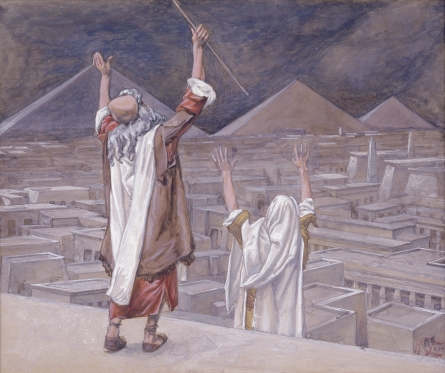
Parashat Bo בֹּא (come), is the third in the Book of Exodus (10:1–13:16). The parashah tells of the last three plagues on Egypt, suffered by the Egyptians, and the first Passover. Locusts (אַרְבֶּה, arbeh), Darkness (חֹשֶׁךְ, choshech), and the slaying of the firstborn. In Exodus we are given the laws of Passover, both as they were observed that first time and as they are meant to be kept for future generations.

Was Pharoah an evil man?
If G-d hardened as Pharoah heart, thus making him stubborn, should we blame Pharoah? Did he have any control over the situation or free will? Was Pharoah an evil man? Why did G-d create evil people? Why does G-d allow so much suffering?
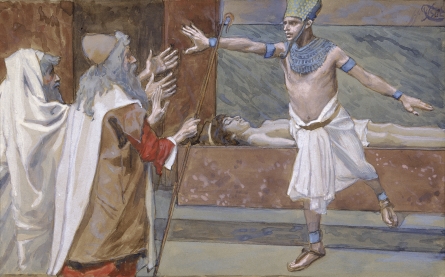
Tishrei versus Nissan
The Jewish New Year is always on Rosh Hashanah, which falls in the month of Tishrei. However in this week’s reading, as the ‘Leaving of Egypt’ took place in the month of Nissan, we name this month as the first and head of all months (Ramban Shemot 12:2), because, the purpose of being released from slavery in the land of Egypt was that we would now solely have only one master, G-d. The month of Nissan is important because it is the birth month of Israel as a nation.

The first Mitzvot
Rosh Chodesh
The very first mitzvah that was given to the Jewish people, before the last plague began, is that The judges of the Beit Din should always fix the beginning of a new Jewish month. We are introduced to the laws of Rosh Chodesh in this parashah (Shemot 12:2). The Jewish calendar comprises of 354 days, which follows a lunar calendar, unlike the calendar we follow in various countries outside of Israel which comprises of 365 days. Every Rosh Chodesh is accompanied with Hallel and reading portions of the Torah. It is a time to look for renewal and try to improve one’s ways and look for a better month.

In the closing verses of the portion, G-d instructs Mosheh on various ways the Israelites are to commemorate the Exodus on an annual basis. In addition to celebrating Passover each year, the people are to dedicate their firstborn children and animals to G-d’s service, in appreciation for being saved from the Death of the Firstborn in Egypt; and males are to place phylacteries between their eyes and upon their arms each day as a sign of G-d’ strong arm in taking them out of Egypt.
Mezuzah

G-d commands each household to take a lamb, they are to slaughter the lamb and roast it, brushing its blood on the door frames of their homes so that the angel of death will recognize and “pass over” each Jewish household. As a side note, the tradition of marking a Jewish home with a mezuzah originated from parashat Bo. The Hebrew letters Shin, Daled and Yud, which are written are initials for: Shomer Dlatot Israel, The guardian of Jewish homes.
Korban Pesach
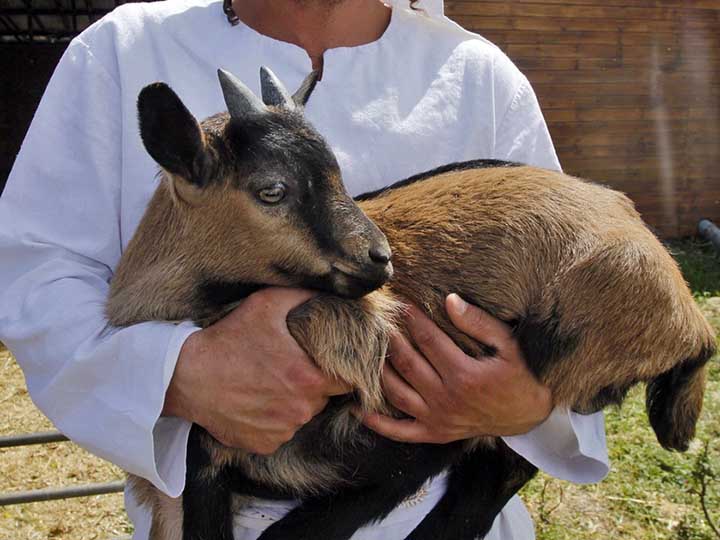
We are then introduced to the laws of the Korban Pesach, they are to eat the roasted lamb accompanied by bitter herbs and matza, a special unleavened flatbread, while dressed for a journey, with shoes on and walking stick at the ready. The entire lamb must be finished, with any leftovers burned the next morning; therefore, G-d tells the people families should join together to make sure that there are enough people to consume it. The blood on the doorpost is meant to ensure G-d passes over the homes of the Israelites during His attack on Egyptian firstborns, set to take place the same night. In order to partake in a feast of the Korban Pesach, one has to be circumcised (Shemot 12:48).
Pidyon Haben
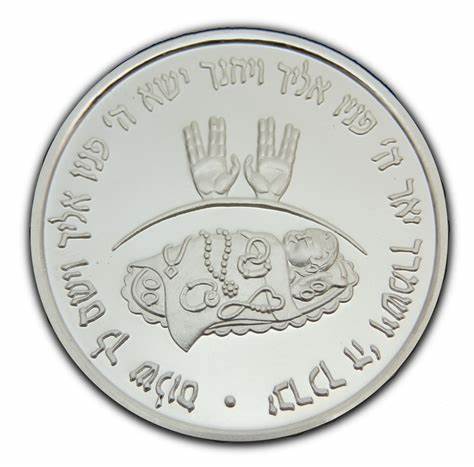
Also Pidyon Haben, introducing the mitzvah of the “redemption of the first born” where at first, the first born was supposed to serve in the Temple, the mitzvah was taken away from the first born of each tribe and given to the Levi tribe who were against the Golden Calf incident.
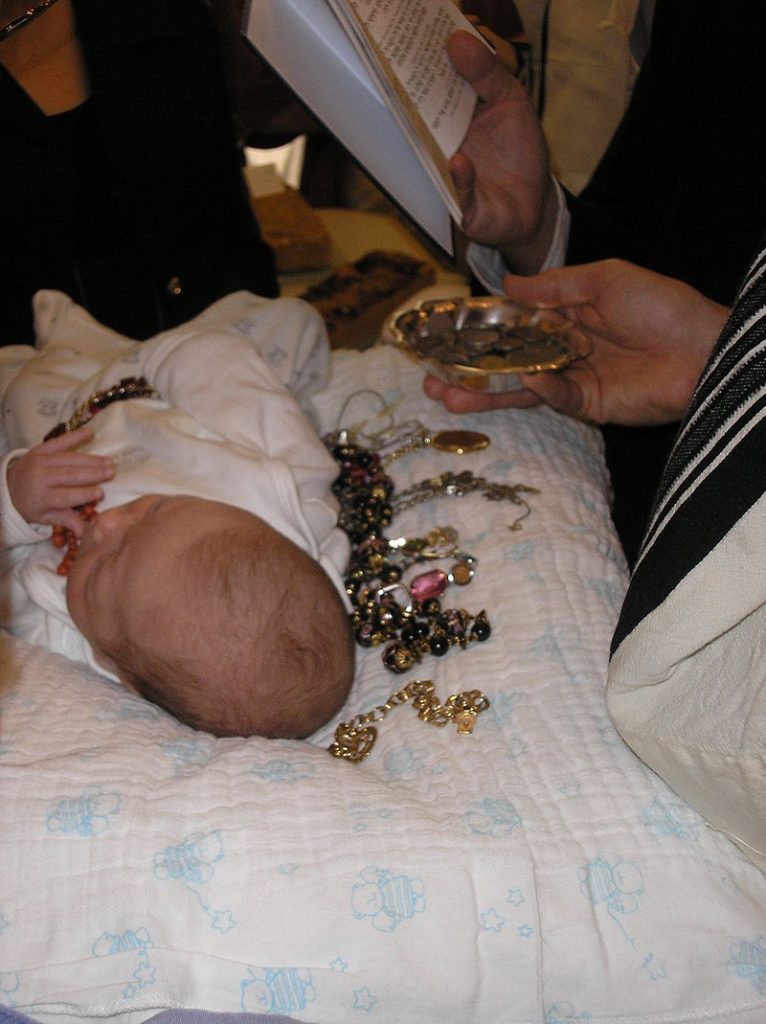
The Shulkhan Arukh states that when a Jewish woman gives birth to a firstborn male by natural means, the father of the child must “redeem” the child from a known Kohen representing the original Temple priesthood, for the sum of five silver Shekels, or equivalent in country’s currency. The procedure does not apply when the father is a Kohen or Levite, and does not normally apply when the mother is the daughter of one. This redemption ceremony is performed when at least thirty days have passed since the child’s birth. If the 31st day falls on Shabbat or a festival, the redemption is delayed, because any sort of business transaction is not allowed on those days.
Tefillin
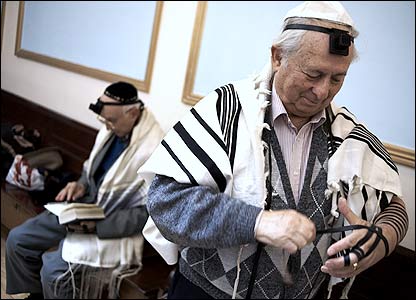
We are also introduced to the mitzvah of Tefillin at the end of the Parshah (Shemot 13:16); The Tefillin have to be worn on the head and the weaker arm, to testify that one’s thoughts should always be done correctly and actions done well with their arms and that they fear and love G-d at all times.
Exodus
At midnight, G-d moves across Egypt, smiting their firstborn children and animals as promised. In despair, Pharaoh calls to Mosheh and Ahron, telling them to take the Hebrews out from among his people and go serve G-d in any manner they wish. As G-d had told them to do earlier, the Israelites ask their Egyptian neighbors for gold, silver and garments, and their requests are granted.

The Israelites are freed from Egypt after 430 years (Exodus 12:40) They number 600,000 men alone, not counting women, and children. There, they baked leftover dough from the night before into matza.
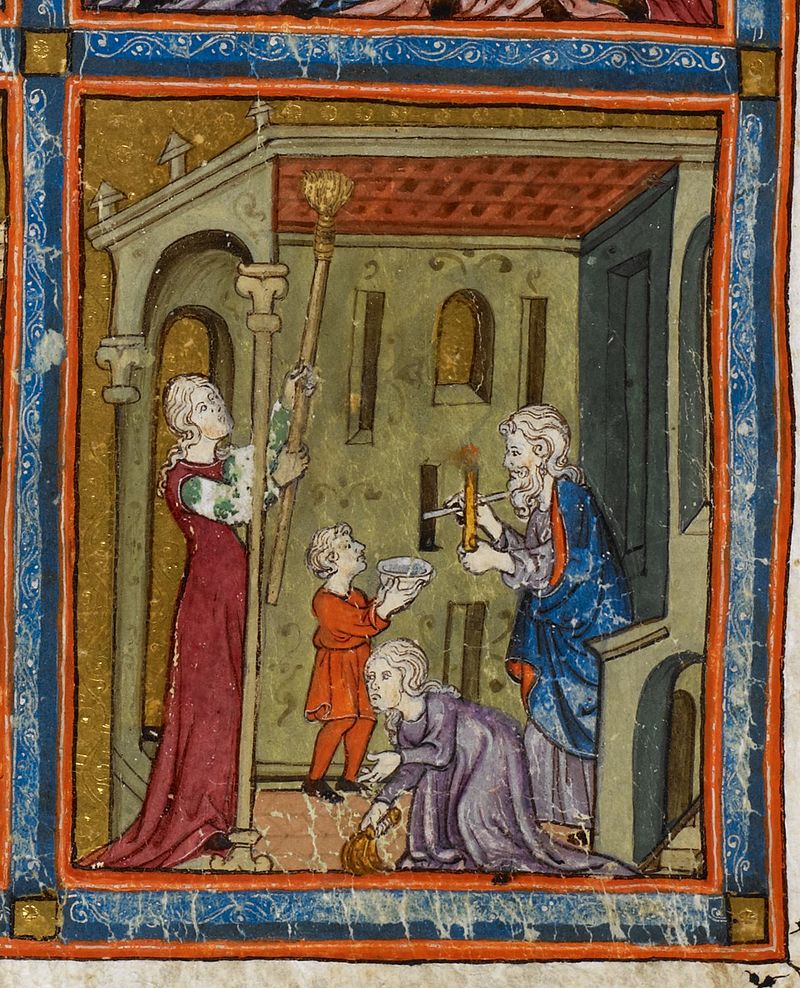
Brit Milah
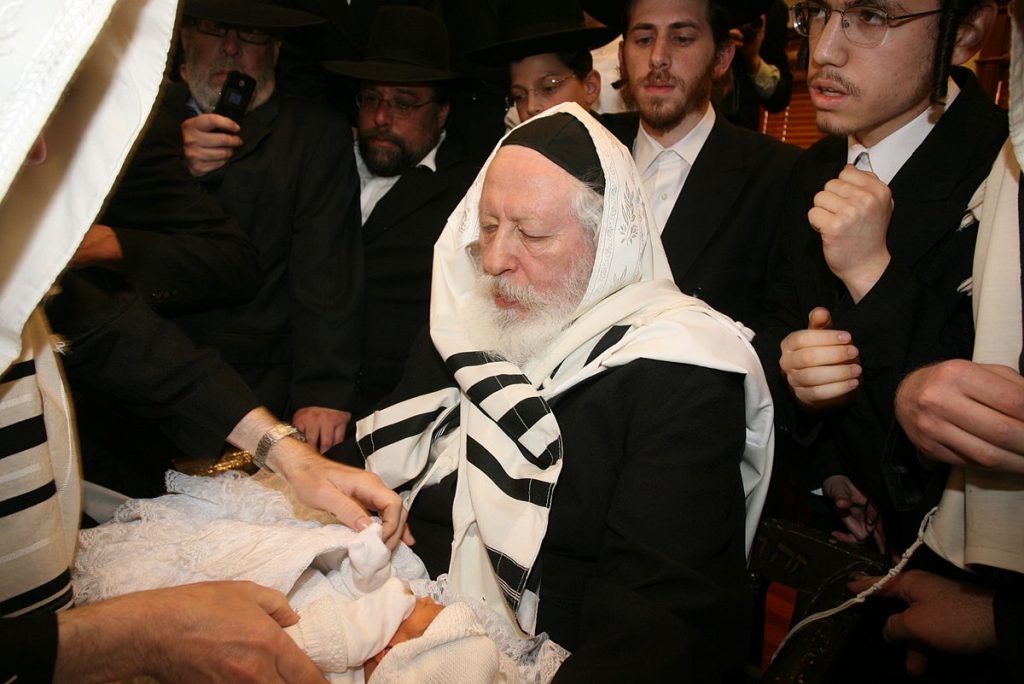
G-d also adds details regarding future sacrifices: every male is obligated to participate, but no stranger may eat from it; males must be circumcised (Brit Milah) to partake; and it must be eaten in one place.
Aviv

G-d states that the people are to remember the day they left Egypt, saying it is in the month of Aviv, which means ‘springtime’, why G-d makes a point of saying that it is the spring month? To show G-d is compassionate, taking the Israelites out of slavery and on a desert journey at a time of year when the weather is most pleasant. It is also a time of rebirth, and what better time to establish the birth of a nation than spring! Mosheh, under G-d’s instruction, said that they would leave the following morning, as it is dangerous to set out on a journey at night. The next morning, the Jews commenced the Exodus from Egypt (Shemot 12:37-42), leaving Egypt with a huge abundance of Gold and Silver (Shemot 12:35-36).
Let My People Go!
“Then the LORD said to Mosheh, Come to Pharaoh, for I have hardened his heart” Rebbe Nachman of Breslev teaches that G-d is constantly trying to get us to soften our hearts. Whatever your situation, everything in your life, even the seemingly random, is a message to “Let My people go so they may serve Me” (Exodus 9:1).
Rebbe Nachman of Breslev
“Ordinary people cannot perceive from every detail of life every hint” says Rebbe Nachman, “but we ready ourselves to hear and accept the message through simple activities: Sleeping, Tzitzit and Tefillin, Torah study (including reading the Shema), Prayer and Business. Each, in its way, prepares a person to understand what s/he needs to understand to become a better Jew.”
May we all become better people. Kol Tuv.

The 613 Mitzvot
In The Torah there are 613 commandments, mitzvot, also known as the Law of Moses (תרי״ג מצוות, taryag mitzvot). The 613 mitzvot are first recorded in the 3rd century CE, when Rabbi Simlai mentioned it in a sermon that is recorded in Talmud Makkot 23b.
The 613 commandments include 248 “positive commandments”, to perform an act (mitzvot aseh), and 365 “negative commandments”, to abstain from certain acts (mitzvot lo taaseh). The negative commandments number 365, which coincides with the number of days in the solar year, and the positive commandments number 248, a number ascribed to the number of bones and main organs in the human body.
Though the number 613 is mentioned in the Talmud, its real significance increased in later medieval rabbinic literature, including many works listing or arranged by the mitzvot. The most famous of these was an enumeration of the 613 commandments by Maimonides, The Rambam.
Many of the mitzvot cannot be observed now, following the destruction of the Second Temple, although they still retain religious significance. According to one standard reckoning, there are 77 positive and 194 negative commandments that can be observed today, of which there are 26 commands that apply only within the Land of Israel. Furthermore, there are some time-related commandments from which women are exempt (examples include shofar, sukkah, lulav, tzitzit and tefillin). Some depend on the special status of a person in Judaism (such as kohanim), while others apply only to men or only to women.
According to Rambam Organized by Parsha. based on Wikipedia and http://www.vaadrv.org/rambam613mitzvot.asp ONE BIG IMPORTANT NOTE WHEN USING THIS LISTING: This listing is not all inclusive. Rambam may site multiple sources for a mitzvah is his works but this list currently only gives one source for each mitzvah.
The 21 Mitzvot in Parashat BO
- Courts must calculate to determine when a new month begins Ex. 12:2
- To slaughter the paschal sacrifice at the specified time Ex. 12:6
- To eat the Paschal Lamb with matzah and Marror on the night of the fourteenth of Nissan Ex. 12:8
- Not to eat the paschal meat raw or boiled Ex. 12:9
- Not to leave any meat from the paschal offering over until morning Ex. 12:10
- To destroy all chametz on 14th day of Nissan Ex. 12:15
- To eat matzah on the first night of Passover Ex. 12:18
- Not to find chametz in your domain seven days Ex. 12:19
- Not to eat mixtures containing chametz all seven days of Passover Ex. 12:20
- An apostate must not eat from it Ex. 12:43
- A permanent or temporary hired worker must not eat from it Ex. 12:45
- Not to take the paschal meat from the confines of the group Ex. 12:46
- Not to break any bones from the paschal offering Ex. 12:46
- An uncircumcised Kohen must not eat Terumah Ex. 12:48
- An uncircumcised male must not eat from it Ex. 12:48
- Not to eat chametz all seven days of Passover Ex. 13:3
- Not to see chametz in your domain seven days Ex. 13:7
- To relate the Exodus from Egypt on that night Ex. 13:8
- To set aside the firstborn animals Ex. 13:12
- To redeem the firstborn donkey by giving a lamb to a Kohen Ex. 13:13
- To break the neck of the donkey if the owner does not intend to redeem it Ex. 13:13

The Priestly Blessing
יְבָרֶכְךָ יהוה, וְיִשְׁמְרֶךָ- May the LORD bless you and guard you
יָאֵר יהוה פָּנָיו אֵלֶיךָ, וִיחֻנֶּךָּ -May the LORD make His face shed light upon you and be gracious unto you
יִשָּׂא יהוה פָּנָיו אֵלֶיךָ, וְיָשֵׂם לְךָ שָׁלוֹם- May the LORD lift up His face unto you and give you peace
Check out YedidYah “The Priestly Blessing” Birkat Hakohanim. Music by Rabbi Yakira Yedidia https://youtu.be/YNE11QdEMN0
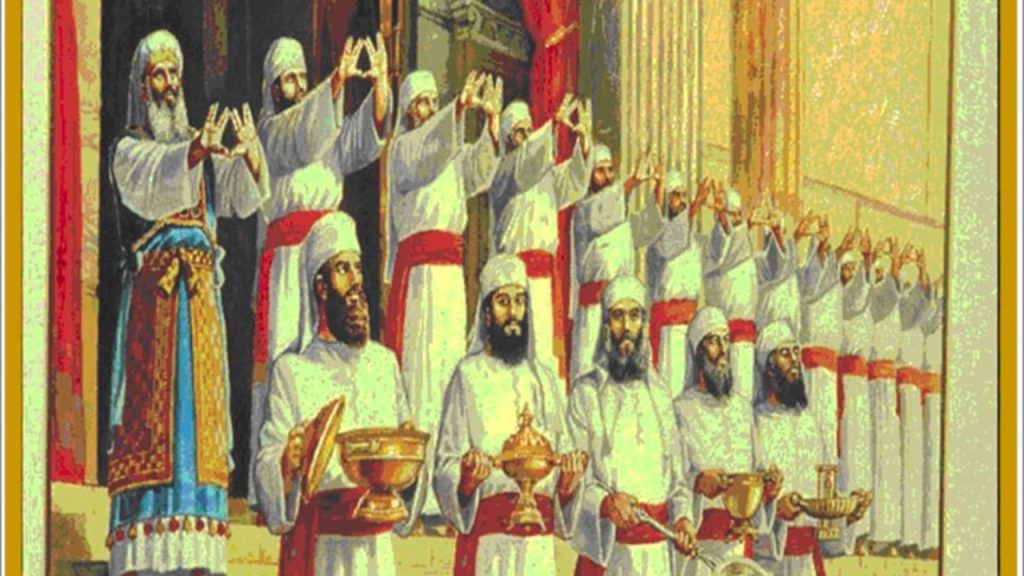
#####
This blog article was inspired by chabbad.org

